
by pmdavis | Aug 9, 2019
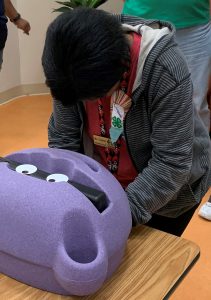
Looking for spots missed during hand washing by using black light and glow germ lotion that fluoresces under black light.
It’s hard to believe it is August already, with that we are getting ready to go back to school. Going back into the large group gathering requires a reminder to wash your hands often. You and your child will be around so many people and exposed to all kinds of germs. Regular hand washing helps you avoid getting sick and spreading your germs to others.
The CDC recommends that we wash our hands:
• Before, during, and after preparing food
• Before eating food
• Before and after caring for someone who is sick
• Before and after treating a cut or wound
• After using the toilet or after changing diapers or cleaning up a child who has used the toilet or been ill
• After blowing your nose, coughing, or sneezing,
• After touching an animal, animal/pet feed or treats, or animal waste
• After touching garbage
Take a moment to sit down and talk with your child about hand washing and the importance of washing their hands, especially when they get home from school.
Try this activity written by Tennessee 4-H to help youth see where they may be missing germs. This simple activity uses items you probably have in your kitchen. Begin by coating hands with a tablespoon of cooking oil. Next, sprinkle the oily hands with ground cinnamon. Have your child wash their hands using the steps outlined below. Once they have finished washing, have them smell their hands to see if they can still smell cinnamon. If they washed their hands correctly, the cinnamon smell and brown color should be gone from their hands.

A. Hands coated with cinnamon before hand washing
B. Quick wash like youth often do missing in between fingers, top of wrist, around nails
C. Thoroughly washed hands (all clean even between fingers)
Here are the steps we teach youth when they take our 4-H hand washing classes:
1. Wet your hands with clean, running water.
2. Apply soap and rub your hands together to make a lather. Make sure to get in between your fingers, under your nails, and on the top of your hands. Youth often miss these areas when we do a lesson on hand washing during 4-H events.
3. Scrub for at least 20 seconds—about the same amount of time needed to sing the Happy Birthday or ABC Song twice.
4. Finish by rinsing your hands with warm running water.
5. Dry hands with a clean towel or let air dry if a towel is not available.
6. Use the towel to turn off the water faucet to prevent re-contamination of your clean hands on a dirty faucet knob.
Have a fun and germ free day! 4-H is a family affair, offering many opportunities where both children and parents can participate in common interests. 4-H is one of the nation’s most diverse organizations and includes people from all economic, racial, social, political, and geographic categories. There are no barriers to participation by any young person. Participants are given the opportunity to engage in activities that hold their personal interest, while being guided by adult volunteers.
To find out more information about other 4-H programs like this or volunteer your time to work with youth, please contact your local UF IFAS County Extension Office.

by aschortinghouse | Jun 27, 2019

Use sparklers in an open area and keep pets and small children away. Photo by John Paul Tyrone Fernandez
Sparklers and fireworks have often been a highlight of celebrations throughout the summer months. While enjoying your summer celebrations, it is important to know that Florida has strict firework laws. According to the South Walton Fire District’s July 4th PSA Transcript, under current Florida law, only sparklers approved by the Florida Division of State Fire Marshal are legal to use. A person responsible for illegally setting off fireworks may be charged with a first-degree misdemeanor. The State Fire Marshal’s website is home to a list of approved sparklers which you can here.
SAFETY FIRST
While many do not view sparklers as extremely dangerous, they still have the potential to be very dangerous. If you are enjoying approved sparklers at home, use the 5 following tips to help prioritize safety while enjoying the holiday.
- Use sparklers in an open area and keep pets and small children away
- Keep a water hose or fire extinguisher nearby for emergencies.
- Do not carry or store sparklers in pockets.
- Purchase sparklers from a licensed vendor.
- Use a bucket of water to collect the used sparklers. Sparklers may cause fires if not thoroughly extinguished.
FIREWORK SHOWS

Consider taking your family to a professional fireworks show this year. Photo by Peter Spencer
4th of July firework shows are exciting for people of all ages to watch. However, fireworks can be very costly, dangerous to setup and most require special permits in certain settings and conditions. Consider taking your family to a professional fireworks show in your area. Make it a family tradition, complete with a family picnic for the evening. Often times, churches and civic organizations will provide professional firework displays with free food for the entire family, just to keep everyone safe for the evening.
There are numerous professional fireworks shows put on throughout the Florida Panhandle. Click here for a list of firework shows on the 4th of July. Be safe and enjoy the beautiful Florida weather!
Happy Independence Day!
REFERENCES
by Rachel Pienta | Jun 7, 2019
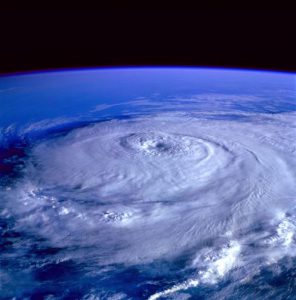
Hurricane Michael was the first ever Category 5 hurricane on record to impact the Florida Panhandle.
Are you ready? The 2019 Atlantic hurricane season began June 1. The official hurricane weather season continues until November 30, 2019. For Florida residents, it is never too early and not too late to prepare for this year’s hurricane season. NOAA’s Climate Prediction Center released a forecast prediction reporting a 40% chance of a “near-normal” Atlantic hurricane season and a 30% chance “above normal” indicating a range of 4-8 hurricanes, including 2-4 hurricanes of category 3 or higher. With this information provided as a means to increase disaster preparedness awareness, it is imperative that our families take action now to minimize the anxiety, stress, and hardships that occur when a disaster strikes. The following information details three family-friendly disaster preparedness activities to complete during the month of June to be hurricane ready for the 2019 season followed by useful informational links.
Build a Disaster Preparedness Bucket
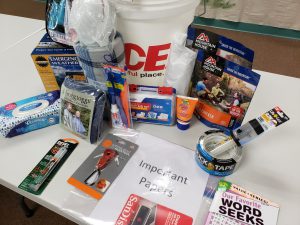
The contents of a disaster bucket assembled by Wakulla County Emergency Management Director Jennifer Nagy.
One annual activity that families can do together is “build a disaster preparedness bucket.” Families may prepare large plastic storage containers with lids for hurricane snacks and other necessary items. In a storm situation where conditions may require you to move to safety, preparing a 5 gallon bucket with a lid full of recommended essential items will provide a portable, easy-to-store alternative that the whole family can use. Buckets may be purchased at local hardware or home improvement stores. In your area, organizations like your local city or county emergency management department or the Red Cross may offer a bucket giveaway program with pre-stocked disaster preparedness kits.
Talk About Your Communications Plan
As a family, decide who will be the point of contact for all members to contact in case of emergency. This activity is an excellent way to engage your child in critical thinking and problem solving. The person or people should be located outside the impacted area – a grandparent or other relative or family friend in another state would be one possibility. Provide each family member with a laminated contact list – with emails, phone numbers, and addresses – that can be kept in disaster preparedness kits, saved in phones, or stored in wallets and backpacks. Local business supply stores, mail or copy centers in your area may offer laminating services to make waterproof contact lists for safe storage and easy reference.
Have a “Meals To Ready” Taste Test Dinner
After a disaster, your family may be without power for several days or longer. To enjoy safe, hot meals, one option is “meals ready to eat” also known as MREs. MREs are a complete, filling & nutritious way to feed your family. MREs can be purchased online or in the camping section of stores like Bass Pro or Wal-Mart. These meals have a long shelf life and can be stored for months until needed. Some MREs include built-in heaters while others require boiling water to prepare. Camping MREs tend to be an entrée only. Military style MREs will have most, if not all, of the following components: entrée, side dish, bread, spread, dessert, cold drink mix, instant coffee, spoon, condiments, napkin, moist towelette, and a flameless ration heater.
Completing an MRE taste test as a family planning activity will help you determine which products your children will eat when the time comes to use the MREs. The taste test can be fun for the whole family – have everyone taste and then rate each meal or meal component on a scale of 1 to 5 – with 5 being the best possible in flavor and food quality. When you get ready to purchase a supply of MREs, you will know whether your family is going to prefer lasagna to white chicken chili and can shop with confidence!
For more information about hurricane season preparation or 4-H programs in your county, please contact your local UF IFAS County Extension Office, or visit http://florida4h.org.
Resources
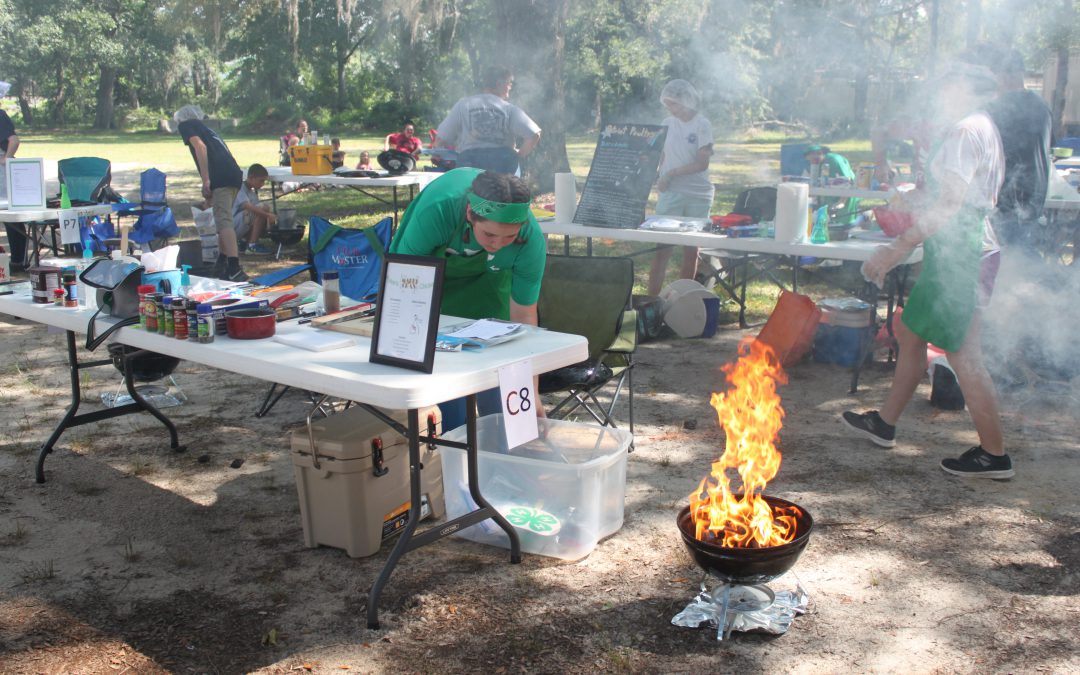
by bestevez | May 29, 2019
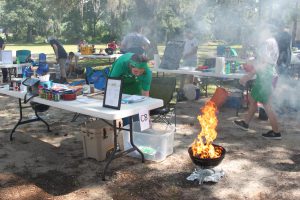
A 2018 NW District 4-H Tailgating Contest participant prepares to grill
Imagine the smell of a charcoal grill on a breezy summer day. A neighbor is grilling in their backyard, and you wish you were invited over for dinner. Would it be even better if it was your child or grandchild doing the grilling for you?
Fire up Your Grill!
4-H members have been firing up their charcoal grills and participating in the Florida 4-H Tailgating Contest since 2016. Designed to promote the use of animal protein in the diet, youth learn the art and science of safely preparing beef, pork, poultry, and seafood in an outdoor setting providing opportunities for 4-H youth to develop life skills, including decision making and healthy lifestyle choices.
In the Florida 4-H Tailgating Contest, youth grill two, 6-8 ounce portions of one of the following proteins:
- beef
- pork
- poultry – turkey breast or half chicken
- shrimp – fresh, headless and de-veined
While youth are grilling, judges observe food and fire safety actions and ask questions about the recipe and safety knowledge. A team of judges evaluates the cooked product by taste testing and scoring each entry.
4-H Tailgating District Contest
After youth compete at county contests or participate in day camps, they can register for the district contest. There are four district contests hosted throughout the state including our Northwest District contest held at the Washington County Ag Center on July 20, 2019. Cash prizes at the district level are awarded in each protein category – 1st place $400, 2nd place $250, 3rd place $100 and 4th place $50.

Scholarships and prizes are awarded thanks to these sponsors.
4-H Tailgating State Contest
The top two winners from each protein are then eligible to compete in the state contest held at the University of Florida on September 28, 2019. For the state contest, the 1st place winner in each protein area receives a $1,500 college scholarship and the 2nd place winner receives a $1,000 college scholarship.
Since the Florida 4-H Tailgating contest began in 2016, over $63,000 in scholarship money has been awarded to Florida 4-H members made possible by sponsorships from Winn-Dixie, National Beef, and Sonny’s.
Learn More at a Tailgating Day Camp
Last summer, over 100 youth attended day camps to learn about identifying cuts of meat, preventing food cross contamination and food-borne illnesses, grilling techniques, food safety and fire safety. Contact your local UF/IFAS Extension office to find a grilling day camp near you so you can participate in the 2019 Northwest District 4-H Tailgating Contest! Follow us on Facebook to see event details!
Resources
by Yolanda Goode | Mar 15, 2019

Are you physically or mentally running on E?
Are you racing “90 to nothing” in your daily life? until something forces us to hit the brakes or the emergency brake is applied. Instead of clearing our plates, we add sideboards onto them so that we can accept more.
We wear many hats outside of work such as a family member, caregiver, volunteer, student, etc. Some days we find ourselves in foul moods where we lack comprehension, patience, and focus. Is it because we are hangry (hungry + angry) or just plain ole tired? You’ve heard the saying; “you can’t squeeze blood from a turnip”… or is that a beet?…LoL, you get the point. How do we avoid the breakdown that can and will happen if we keep pushing ourselves without intentional refueling?
Here are several tips to help you stay fueled and refreshed:
- Block scheduling: I shared a photo of a tool that I use, but you use what works for you. The key thing is for you to understand where you can capture time for yourself to refuel.
- Rest: Sleep on a regular schedule and take breaks during the day.
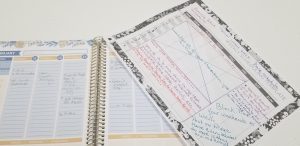
- Eat well: physically, mentally, emotionally, and spiritually.
- Have some fun: You are encouraged to have fun. Adulting is tough.
- Take lunch: Go visit a local library, museum, or sit in your car at a local park.
- Vacation: Plan for it, and take it. But leave some recovery time, so you are not rushing back to work the next day. Another option is weekend trips or a day-cations while kid(s) are at school.
- Nurture your hobbies: When was the last time you ____________?
- Guard your time: Once you’ve blocked it out, it’s yours. Don’t let others guilt you into giving it back.
Slowly implement some of these tips into your life, and remember an empty tank is just that. Empty. You will be more productive by taking care of you, and you’ll be better able to wear all those hats.
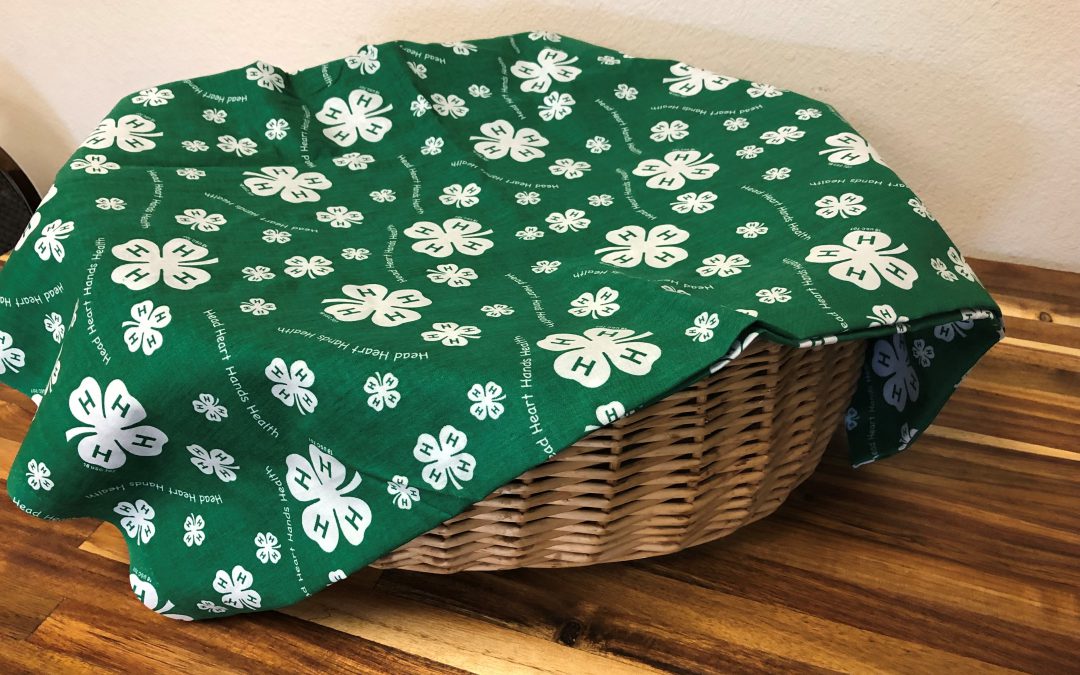
by Marie Arick | Mar 11, 2019

4-H Food Challenge Mystery Basket
Being creative in the kitchen…using a surprise set of ingredients…making a tasty dish…frequent watcher of The Food Network? Then the 4-H Food Challenge camp is the summer day camp for you!
Take a Sneak Peek
Here’s a sample list of possible ingredients in the Fruit & Vegetable category:
- 4 medium potatoes
- 1 cup carrots, sliced
- 1 cup of celery, sliced
- 1 ½ cups green bell pepper strips
- 1/3 cup onions, sliced
- 1 clove garlic, minced
- 1 tomato, cut into wedges
- 3 tablespoons of canola oil, divided
- ½ cup of water
- 2 tablespoons of low sodium soy sauce
- 1 ½ teaspoons of cornstarch
Any idea what you’d prepare? What would you name your dish?
Participants in the 4-H Food Challenge camp will work in teams with 3 to 4 members. Teams will be presented with:
- a food category
- a set of mystery ingredients
- 40 minutes to create a dish, prepare a presentation about their dish, and clean their work area
When time is up, teams will present their creation to a panel of judges describing their collaboration in creating the dish, food safety practices used by the team, how they worked together, and finally, a description of the dish including some nutrition information.
We all eat, so food safety and preparation are skills that we all need. 4-H Food Challenge campers will learn those skills along with nutrition knowledge, teamwork and presentation skills. Look for this day camp opportunity in your local UF/IFAS Extension 4-H program this summer, and join us in putting our skills to the test!
*The 4-H Food Challenge is loosely based on The Food Network show “Chopped” and adapted from the Texas 4-H Food Challenge Contest.















